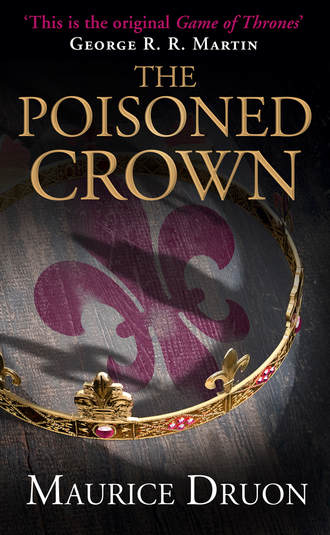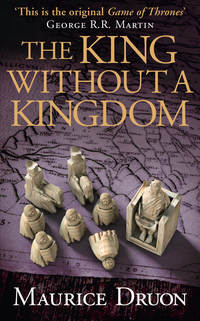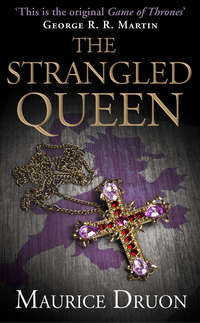
Полная версия
The Poisoned Crown
Hardly had the cavalcade installed itself in one of the palaces of the papal town than Monseigneur Jacques Duèze,5 Cardinal of the Curia, came to greet Clémence of Hungary with a large number of clergy in his train. This old and alchemistical prelate, who had been a candidate for the triple tiara for the last fifteen months, still preserved, in spite of his seventy years, his strangely youthful walk. He danced among the puddles beneath the pouring rain which had put out the torches his people carried before him.
Cardinal Duèze was the official candidate of the family of Anjou-Sicily. That Clémence should be marrying the King of France was clearly an advantage to him and strengthened his position. He counted upon the new Queen to support him in Paris, and thus to win over to him the votes he lacked among his French colleagues.
Agile as a deer, he dashed up the stairs, compelling the pages who were carrying his train to break into a run behind him. He was accompanied by Cardinal Orsini and the two Colonna Cardinals, who were equally devoted to the Neapolitan interest. They had some difficulty in keeping up with him.
Though his handkerchief was to his nose and his speech hoarse, Messire de Bouville resumed some of his ambassadorial dignity to receive these empurpled dignitaries.
‘Well, Monseigneur,’ he said to the Cardinal, treating him as an old acquaintance, ‘I see that it is easier to meet you when one is accompanying the niece of the King of Naples than when one comes to you on the orders of the King of France. It is no longer necessary to gallop across country in search of you.’
Bouville was in a position to permit himself such amiable teasing; the Cardinal had cost the French Treasury four thousand pounds.fn4
‘The fact is, Monseigneur,’ the Cardinal replied, ‘that Madame Marie of Hungary and her son, King Robert, have consistently done me the honour of giving me their pious confidence and the union of their family to the throne of France, by means of this fair Princess of high repute, is an answer to my prayers.’
Bouville heard once more that strange voice which was at once rapid, broken, smothered, and almost extinct, seeming to issue from some throat other than the Cardinal’s and to be directed at some third person. At the moment, what he had to say was addressed to Clémence, whom the Cardinal never quitted with his eyes.
‘Moreover, Messire Comte, circumstances have some-what changed,’ he went on, ‘and we no longer perceive the shade of Monseigneur de Marigny behind you, and he held power for a long time and seemed always ready to practise defenestration. Is it true that he was proved to be so dishonest in his accountancy that your young King, of whose charity of soul we are all aware, was unable to save him from just punishment?’
‘You know that Messire de Marigny was my friend,’ replied Bouville courageously. ‘He began as a page in my household. I think that his agents, rather than himself, were dishonest. It was a grief to me to see a friend of so old a standing come to disaster through stubborn pride and a desire to control everything himself. I warned him ...’
But Cardinal Duèze had not yet reached the end of his perfidious courtesies.
‘You see, Messire,’ he went on, ‘that there really was no need to press so hastily for your master’s annulment, about which you came to speak to me. Providence often comes to our rescue, provided one is prepared to assist it with a firm hand.’
He never took his eyes off the Princess. Bouville hastened to change the subject and to lead the prelate aside.
‘Well, Monseigneur, how goes the Conclave?’ he asked.
‘It’s still in the same state, that is to say nothing has supervened. Monseigneur d’Auch, our revered Cardinal Camerlingo, has not succeeded, or does not wish to succeed, for reasons known only to himself, to bring us into assembly. Some of us are at Carpentras, others at Orange, we ourselves are here, and the Caetani are at Vienne.’
Thereupon, he launched into a subtle but, neverthe less, ferocious indictment of Cardinal Francesco Caetani, the nephew of Boniface VIII and his most violent adversary.
‘It is so delightful to watch him display so much courage today in the defence of his uncle’s memory; nevertheless, we are unable to forget that, when your friend Nogaret came to Anagni with his cavalry to besiege Boniface, Monseigneur Francesco abandoned his devoted relation, to whom he owed his hat, and, dressed as a footman, took flight. He seems born to felony as others are to the priesthood,’ said Duèze.
His eyes, alight with senile anger, seemed to shine from the depths of his withered, sunken face. To listen to him, one would have thought that Cardinal Caetani was capable of the most heinous crimes; the devil was clearly in him.
‘And, as you know, Satan may appear anywhere; and surely nothing could be more grateful to him than to establish himself within the College of Cardinals.’
And, what’s more, to speak of the devil at that period was not merely a conversational image; his name was not mentioned lightly, since it might be a prelude to a ban of heresy, to torture and the scaffold.
‘I am well aware,’ Duèze added, ‘that the throne of Saint Peter cannot remain indefinitely vacant, and that this is bad for the whole world. But what can I do? I have offered myself, however little I may desire to accept so heavy a task; I have offered to accept the burden since it appears that agreement can be achieved only upon myself. If God, in selecting me, wishes to raise the least worthy to the highest place, I submit to the will of God. What more can I do, Messire de Bouville?’
After which he presented Princess Clémence with a superb copy, richly illuminated, of his Elixir des Philosophes, a treatise on hermetic philosophy which had considerable renown among the specialists of the subject and of which it was extremely doubtful that the Princess would understand a single word. For Cardinal Duèze, a master of intrigue, possessed a universal mind, was versed in medicine, alchemy, and in all the humane sciences. His works were to stand for another two centuries.
He departed, followed by his prelates, vicars, and pages; he was already living a Pope’s life and would deny, to the limits of his strength, election to anyone else.
When, the following morning, Madame of Hungary’s cavalcade took the road for Valence, the Princess asked Bouville, ‘What did the Cardinal mean yesterday when he spoke of assisting Providence to accomplish our desires?’
‘I don’t know, Madam, I don’t very well remember,’ replied Bouville, embarrassed. ‘I think he was talking of Messire de Marigny, but I didn’t very well understand.’
‘It seemed to me that he was speaking rather of my future husband’s annulment, which was impossible of realization. Of what did Madame Marguerite of Burgundy die?’
‘Of a chill she caught in her prison, and of remorse for her sins without doubt.’
And Bouville blew his nose to conceal his disquiet; he knew only too well the rumours which were current about the sudden death of the King’s first wife and had no wish to speak of them.
Clémence accepted Bouville’s explanation, but it did not set her mind at rest.
‘I owe my future happiness,’ Clémence said to herself, ‘to the death of another.’
She felt herself to be inexplicably allied to this queen whom she was to succeed and whose sins caused her as much horror as the punishment inspired her with pity.
Is not true charity, so rarely felt by those who inculcate it, precisely the emotion which impels the individual, however unreasonably, to identify himself with the crime of the criminal as well as with the responsibility of the judge?
‘Her sins led to her death, and her death to my becoming queen,’ Clémence thought. She saw it as a sort of judgement upon herself and felt that she was surrounded with portents of disaster.
The storm, the accident to the young Lombard, and the rain which was becoming calamitous, were all signs of ill omen.
For the weather grew no better. The villages they passed through had an appearance of desolation. After a winter of famine, the harvest had promised well and the peasants had regained courage; a few days of mistral and terrible storms had shattered their expectations. And now apparently inexhaustible rain was rotting their crops.
The Durance, the Drôme, and the Isère were in flood and the Rhône, along whose banks they were journeying, was dangerously swollen. From time to time they had to stop to free the road of a fallen tree.
For Clémence, the contrast between Campania, where the sky was always blue and the people smiling, the orchards laden with golden fruit, and this ravaged valley, haunted by a wasted populace and depressed villages, half-depopulated by famine, was depressing.
‘And the farther north we go, doubtless the worse it will become. I have come to a hard land.’
She wished to relieve all the misery she saw, and constantly halted her litter to distribute charity to anyone who seemed in need. Bouville was compelled to reason with her.
‘If you give at this rate, Madam, we shall not have enough left to reach Paris.’ It was when she arrived at Vienne, the home of her sister Beatrice, who was married to the ruling Prince of Dauphiné, that she learnt that King Louis X had just left to make war upon the Flemings.
‘Dear Lord,’ she murmured, ‘am I to be widowed before even setting eyes upon my husband? Have I arrived in France merely to witness disaster?’
5
The King Receives the Oriflamme

ENGUERRAND DE MARIGNY, during the course of his trial, had been accused by Charles of Valois of having sold himself to the Flemings in negotiating with them a peace treaty which was contrary to the interests of the Kingdom.
And now, when Marigny had but barely been hanged in the chains of Montfaucon, the Count of Flanders had broken the treaty. To do so he had employed the simplest means: he had refused, though summoned, to come to Paris to render homage to the new King. At the same time he ceased to pay the indemnities and reaffirmed his claim to the territories of Lille and Douai.
Upon receiving this news, King Louis X fell into an appalling rage. He was subject to fits of fury which had won for him the nickname of ‘Le Hutin’ and which terrified his entourage, not only for themselves but for him, since at these moments he bordered upon dementia.
His rage, upon hearing of the Flemings’ rebellion, surpassed in violence anything that he had manifested before.
For many hours, as he prowled about his study like a wild beast in a trap, his hair in disorder, his neck empurpled, breaking ornaments, kicking chairs over, he incessantly shouted meaningless words, while his cries were interrupted only by fits of coughing which bent him double, half suffocating him.
‘The indemnity!’ he cried. ‘And the weather! Oh, they’ll pay for the weather too! Gibbets, that’s what I need, gibbets! Who’s refused to pay the indemnity? On his knees! I’ll have the Count of Flanders on his knees! And I’ll put my foot on his head! Bruges? I’ll set fire to it! I’ll burn it down!’
His tirade was a confused mixture of the names of the rebellious towns, the delay of Clémence of Hungary’s arrival and promises of punishment. But the word that came most often to his lips was that of ‘indemnity’. For Louis X had but a few days before decreed the raising of an extra tax to cover the expenses of the previous year’s military campaign.
Without daring to say so openly people were beginning to regret Marigny and his methods of dealing with this form of rebellion; for instance, his reply to the Abbé Simon of Pisa, who informed him that the Flemings were becoming inflamed: ‘Their ardour in no way astonishes me, Brother Simon; it’s the effect of hot blood. Our lords are also hot-headed and in love with war. Yet the Kingdom of France is not to be dismembered by mere words; deeds are necessary.’ People wanted the same tone to be adopted; unfortunately the man who could have spoken thus was no longer of this world.
Encouraged by his uncle Valois, whose bellicose ardour had in no way been diminished by the exercise of power, on the contrary rather, and who never ceased wishing to give proof of his capacity as a great commander, The Hutin began to dream of valour. He would mobilize the greatest army that had ever been seen in France, fall like a mountain eagle on the rebellious Flemings, carve a few thousand of them to pieces, ransom the rest, bring them to their knees in a week and, where Philip the Fair had never completely succeeded, show the whole world what he was capable of. Already he saw himself returning, preceded by triumphant standards, his coffers filled with plunder and with the indemnities imposed upon the towns, having at once surpassed his father’s reputation and effaced the misfortune of his first marriage, for a war at least was necessary to make people forget his marital disaster. Then, amid a popular ovation, he would gallop home, a conquering prince and a hero of war, to meet his new wife and lead her to the altar and to coronation.
Clearly the young man was a fool and one might have pitied him, because there is always something pathetic about folly, if he were not the ruler of France and its population of fifteen millions.
On June 23rd he summoned the Court of Peers, stuttered violently at them, declared the Count of Flanders to be a felon, and resolved to mobilize the army before Courtrai on August 1st.
This concentration-point was not a particularly good choice. It seems that there are places where disaster has a habit of striking, and Courtrai, to people of that period, sounded very much as the name Sedan does to modern ears. Unless it was that Louis X and his Uncle Charles decided presumptuously upon Courtrai precisely so as to exorcize the memory of the disaster of 1302, one of the few battles lost in the reign of Philip the Fair, at which several thousand knights, charging like madmen in the absence of the king, had foundered in the ditches only to get themselves cut to pieces by the knives of the Fleming weavers; a carnage in which no prisoners were taken.
To maintain the formidable army which was to bring him glory, Louis X needed money; Valois, therefore, had recourse to the expediencies which Marigny had previously employed, while people openly wondered whether it had really been necessary to condemn the old Rector of the Kingdom to death merely so as to reapply his methods less efficiently.
Every serf who could pay for his franchise was freed; the Jews were recalled, on payment of a crushing tax for the right to reside and trade; a new levy was raised on the Lombards who, from then on, looked upon the new reign with less favourable eyes. Two urgently demanded contributions within less than a year was rather more than they expected to be subjected to.6
The Government wished to tax the clergy; but the latter, arguing that the Holy See was vacant and that no decision could be made without a pope, refused; then, in negotiation, the bishops consented to help provided no precedent were created, and profited by the opportunity to get certain concessions, exonerations, and immunities which ultimately were to cost the Treasury more than the funds obtained.
The mobilization of the army took place without difficulty, and was even conducted with a certain enthusiasm by the barons who, pretty bored at home, were delighted with the idea of donning their breastplates and setting off on an adventure.
There was less enthusiasm among the people.
‘Isn’t it enough,’ they said, ‘that we should be half-starved without having to give our men and our money to the King’s war?’
But the people were assured that every ill derived from the Flemings; the hope of loot and free days of rape and pillage were dangled before the soldiers; for many it was a way of easing the monotony of daily labour and the anxiety of finding enough to eat; no one wished to show himself a coward, and if there were recalcitrants, the sergeants of the King or of the great lords were numerous enough to maintain discipline by decorating the trees bordering the roads with a hanging or two. According to Philip the Fair’s Order in Council, which was still in force, no healthy man could, in theory, be exempted if he were more than eighteen and less than sixty, unless he bought himself out with a money contribution or exercised an indispensable trade.
At that time mobilization was a matter of purely local organization. The knights were sworn men, and it was incumbent upon them to raise a force among their vassals, subjects or serfs. The knight, and even the squire, never went alone to war. They were accompanied by pages, sutlers, and footmen. They owned their own horses and arms and those of their men. The ordinary knight without a banneret held approximately the rank of a lieutenant; once his men were assembled and equipped, he reported to the knight of a superior grade, that is to say his immediate suzerain. The knights with pennons were approximately equivalent to captains, the knights banneret to colonels, and the knights with double banners approximated to generals who commanded the whole tactical force raised from the jurisdiction of their barony or their county.
During the battle itself all the knights would upon occasion, leaving their footmen to one side, rally for the charge, often with the splendid results we know so well.
The ‘banner’ of Count Philippe of Poitiers, the King’s brother, must have rallied something in the nature of an army corps, since it assembled all the troops from Poitou, together with those of the county of Burgundy of which Philippe was Count Palatine by marriage; moreover, ten knights banneret were administratively attached to it, among whom were the Count of Evreux, the King’s uncle, Count Jean de Beaumont, Miles des Noyers, Anseau de Joinville, son of the great Joinville, and even Gaucher de Châtillon who, even though Constable of France, that is to say Commander-in-Chief of the armies, had the troops from his fief incorporated into the enormous unit.
Philip the Fair had had good reason for confiding to his second son, before he even reached the age of twenty-two, so important a military command, and for concentrating under his authority, as if to reinforce it, the men in whom he placed the greatest confidence.
Under the ‘banner’ of Count Charles of Valois marched the troops from Maine, Anjou, and Valois, among whom was the old Chevalier d’Aunay, the father of Marguerite and Blanche of Burgundy’s two dead lovers.
The cities were laid under contribution no less than the country. For this Flanders army, Paris had to furnish four hundred horsemen and two thousand footmen, whose maintenance was guaranteed by the merchants of the Cité, fortnight by fortnight, which showed that in the King’s opinion the war would not last long. The horses and wagons for the supply train were requisitioned from the monasteries.
On July 24th, 1315, after some delay, as was always the case, Louis X received, at Saint-Denis, from the hands of the Abbot Egidus de Chambly, who was its ex-officio guardian, the Oriflamme of France, a long band of red silk embroidered with golden flames (from which its name derived), ending in a swallow-tail and attached to a staff of gilded brass. Beside the Oriflamme, which was venerated as might have been a relic, the two King’s banners were carried, one blue with fleurs-de-lys and the other with the white cross.
The huge army set itself in motion with all the contingents that had arrived from the west, the south, and the southeast, the knights from Languedoc, troops from Normandy and Brittany. At Saint-Quentin it was joined by the ‘banners’ of the duchy of Burgundy and those of Champagne, Artois, and Picardy.
That particular day was a rare one of sunshine in an appalling summer. The sun shone upon a thousand lances, on breastplates, and chain-mail, on brightly painted shields. The knights showed off to each other the latest fashions in armour, a new form of helm or bassinet giving greater protection to the face while affording a wider field of vision, or some larger form of ailette which, placed upon the shoulder, gave greater protection against the blows of maces or made sword-thrusts glance off.
Several miles behind the soldiers followed the train of four-wheeled wagons which carried food, forges, supplies of bolts for crossbows, and a variety of traders who were authorized to follow in the army’s wake, as well as whores by the cartful under the control of the brothel-masters. The whole procession advanced in an extraordinary atmosphere which smacked at once of the heroic and the fairground.
The next day rain began to fall once more, soaking, unceasing, flooding the roads, opening ruts, trickling down steel helmets, dripping from breastplates, plastering the horses’ coats. Every man weighed five pounds the heavier.
And it was rain, continuous rain, throughout the following day.
The army of Flanders never reached Courtrai. It stopped at Bonduis, near Lille, before the swollen river Lys, which barred its advance, flooded the fields, swamped the roads, and soaked the clay soil. As it was no longer possible to advance, the army encamped there in pouring rain.
6
The Muddy Army

INSIDE THE VAST ROYAL TENT, embroidered with fleurs-de-lys, but where the mud was as elsewhere ankle-deep, Louis X, in company with his brother the Count de la Marche, his uncle Count Charles of Valois, and his chancellor, Etienne de Mornay, listened to the Constable Gaucher de Châtillon reporting on the situation. The report was not a happy one.
Châtillon, Count of Porcien and Lord of Crèvecoeur, had been Constable since 1286, that is to say from the very beginning of Philip the Fair’s reign. He had seen the disaster of Courtrai, the victory of Mons-en-Pevèle, and many other battles on this threatened northern frontier. He was in Flanders for the sixth time in his life. He was now sixty-five years of age. He was a tall good-looking man, with a determined jaw; neither years nor fatigue seemed to have affected him; he seemed slow because he was reflective. His physical strength and his courage in battle earned him respect as much as his strategical abilities. He had seen too much of war to be enamoured of it any longer, and now merely regarded it as a political necessity. He neither minced his words nor hid his meaning behind vainglorious phrases.
‘Sire,’ he said, ‘food supplies are no longer reaching the army, the wagons are stuck in the mud fifteen miles away, and they’re breaking the traces trying to get them out. The men are hungry and beginning to grumble angrily; the companies who still have food are having to defend their reserves against those who have nothing left; the archers of Champagne came to blows with those of Perche a little while ago, and there is a danger that your troops will fight among themselves before ever they come face to face with the enemy. I shall have to hang some of them, which is not a thing I like doing. But erecting gibbets does not fill stomachs. We’ve already got more sick than the surgeon-barbers can attend to; it will soon be the chaplains who’ll have most work to do. There has been no sign of a break in the weather in the last four days. Two days more and we shall have a famine on our hands, and no one will be able to stop the men deserting in search of food. All the supplies have gone mouldy, rotten, or rusty.’
He pulled off the steel camail which covered his head and shoulders and smoothed his hair. The King walked to and fro, nervous, anxious, and alarmed. From outside the tent came the sound of cries and the cracking of whips.
‘Stop that row,’ cried The Hutin, ‘one can’t hear oneself think!’
An equerry raised the flap of the tent. The rain was still falling in torrents. Thirty horses, sinking in the mud to their knees, were harnessed to a huge wine-cart which they were unable to draw.








